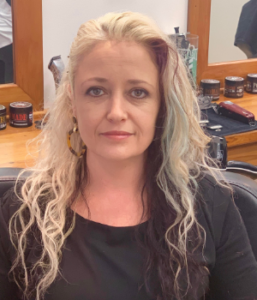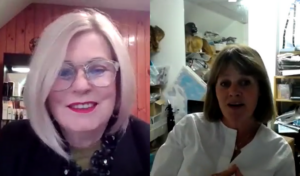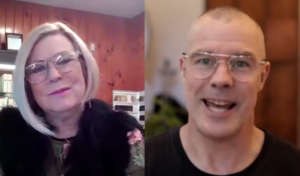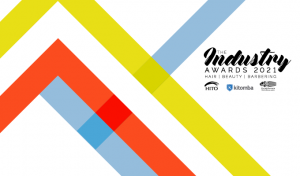Archive for October 2021
Insights from creative hairdressing judge, Sally Brooks
Cathy Davys recently interviewed our creative hairdressing judge Sally Brooks, co-owner of Brooks & Brooks salon in Holborn, London. She’s won some 60 awards with her creative team including London Hairdresser of the Year three times.
Cathy asked her about preparing for competitions, what inspires her, and what she looks for as a judge. Read the full interview below to see what Sally had to say..
You were named British Hairdresser of the Year in 2020, what inspired your collection?
You can imagine being nominated for an award when you’re in the middle of lockdown and you say “How on Earth do I do something?”
I try to always shoot a collection of pictures that I feel represents how the industry is feeling. Every collection I do is completely different – I don’t have one style or one way of doing it. It’s really where my head is at a time.
I’ve wanted to shoot mannequin heads for quite a long time and this seemed like the right time to do it.
Lockdown is actually doing something quite creative. I think as hairdressers our creativity is something that keeps us going.
How do you prepare for photographic competitions?
I usually have an idea of a feeling or an idea of which direction I want to go, but sometimes I just like to challenge myself.
Awards force you to take that idea in your head and put it on a piece of paper. Whereas the idea sometimes can just sit in the back of your head for months. It’s forcing you to actually do the idea that’s in your head.
There are different ways that I work and different channels that I get creativity from and different ways. I set myself budgets and I stick to them. This year was all about spending no money, and sometimes that is more important to me than winning something. It’s actually setting myself something and seeing if I can deliver what’s in my head.
What do you look for as a judge of photographic competition?
There are so many amazing hairdressers across the whole world. But what I’m looking for really is something that captures the imagination of what we’re feeling. Or it’s that one hairstyle that makes you look not just twice, but three times at it.
Do you recommend people enter competitions?
I don’t think it’s a must, but I do think it’s a discipline. I honestly feel that it’s really, really not about winning something, but it is about challenging yourself. It’s a deadline, and it forces you to try something different, and it teaches you a different discipline.
It’s one thing creating a hairstyle in front of you, but it’s another thing putting it in print, and that is a completely different discipline.
So yes, I do think it’s good to enter awards, and I do think it’s good to be told it’s not good enough.
How should someone get started in competition work?
Don’t spend loads of money. It’s not a money competition. If you wanted to enter a competition, you could shoot it on your phone. I do. I honestly believe if you have got a great model with great hair, simplify everything around it so that the hair pops.
We are in a whole different era at the moment where I feel it’s very, very exciting to try new things as we come out of a pandemic and a lockdown across the whole world.
It’s a time to allow the youngsters to have a voice. It’s time to come out with new ideas and new ways of working.
Have you had many mentors and what have they done for you?
Mentors are really important, and I think it depends on what somebody says a mentor is. I still feel like I’m being mentored at the moment by my team, because anytime somebody challenges you or teaches you something, that to me is a mentor. I’ve had amazing people that I’ve surrounded myself with, and we all have a beautiful relationship in this industry because the one common factor that we all have is a passion for our craft.
It is really important to surround yourself with people that are passionate about their craft, passionate about their industry, and passionate about caring about the craft of the industry that will mentor you through your career. If you surround yourself with negative people, people that aren’t as good as you, you’re not going to get better.
What’s inspiring you right now?
I think probably what inspires me at the moment is that I had a chance to sit back and think. I’ve never had children so I’ve never had a sabbatical. I’ve never had time off.
I’m not saying I enjoyed lockdown, but it was a chance for me to try different creative things.
I tried doing pottery, I tried painting, I tried different things. And I think what inspires me at the moment are the people that have used the time wisely to learn something new to keep their positive energy. I think I’m really inspired by that type of person at the moment, and it’s probably made me look at things a little bit differently.
Tough times and challenging times can make you stronger and can also make new avenues for creativity. Take each day as it comes. Get up in the morning, be really positive. Put a smile on your face and whatever gets thrown at you, suck it up. That’s my advice.
Insights from creative hairdressing judge, Richard Kavanagh
Cathy Davys recently had the honour of chatting with Richard Kavanagh, an internationally renowned hairdresser with years of experience and knowledge to share. Richard has worked on hundreds of fashion shows around the world touring with some of the industry’s best. He’s also shot magazine covers for Vogue, Vanity Fair, Harpers Bizarre, Elle Magazine and more.
On top of being well suited for the job as a creative judge in The Industry Awards this year, he’s also got some great advice for creating amazing images. Keep reading to pick up some tips on photoshoots, what makes award-winning images, and more!
Can you share a little bit of your journey with us?
I started hairdressing as an apprentice in Brown's Bay in Auckland in a small suburban salon. I finished my apprenticeship in Devonport and worked in salons around the country until I really decided to focus on my career. I chose the best salon I could possibly work at in Auckland with a bunch of award-winning killers and just surrounded myself with the very, very best people so that I could accelerate my career.
I started entering competitions after about ten years of hairdressing, because I felt that I had to build my craft and some skill so that I had something to showcase, but I probably should have entered a bit earlier.
Once I started entering competitions, I really found a passion for growing my skill and expanding my repertoire, and a drive for improving my understanding of techniques and methods. Photographic competitions really gave me a taste for what it was like to work in the industry beyond the salon.
What would be your advice to young people on where to start with photographic hair images?
My number one piece of advice is—and this is going to sound a little bit weird— try not to think about it like a hairdresser, because when you’re creating a photograph for a photographic entry, whilst the hair is the showcase of your craft and your skill, the vehicle that portrays the hair is the photographic image.
So think about the hierarchy of information from the top-down. When you’re creating an image, first and foremost, it's about the photograph, so think about composition, light, etc. Second of all, think about the model that you're using, how photogenic are they, and what’s the best way you can present them so that they look as close to how you imagine they will look when you build your concept out.
And then once you've got those, start thinking about how you're going to execute the hair, the makeup, the wardrobe, etc. When it comes to hair in the salon, the primary
focus is the hair that's going to walk out the door, but when it comes to doing a photoshoot, the primary result is the photographic image, and the hair is only a part of the end result.
What’s the one “wow” thing you’re looking for as a judge?
So when I'm judging, I'm looking at all the images across the board and I'm comparing them to each other. What I'm looking for is a pop, something that stands out. I know that sounds very vague, but it’s when all the elements come together in a kind of an interesting harmony or juxtaposition.
That doesn't mean when the hair has lots of different things going on, what it means is when the image speaks, because what we're doing as judges is looking at a bunch of images and the things that pop out. We're not looking at the details first, we're looking at the image. We’re asking “Does it speak to me?”, “Does it say something to me emotionally?”, “Do I connect with it as an image?”, and then that’s when I look in at the hair.
Why do you think people should enter?
I think entering competitions has benefits on numerous levels. When I started trying to do something with my career, entering competitions gave me a way to benchmark myself against other hairdressers, to benchmark my skills against myself, and to have a tangible outcome or result that I could look at and then go, okay, how could I do better next time?
So it gives you a way of improving yourself and growing your skills that's not abstract. It's not based on whether somebody likes you or doesn't like you. It helps you get really analytical with yourself and go, okay, what did I do? What's one thing I’d do differently if I did it again?
It gives you a way to grow and improve technically, conceptually and contextually. So when we do hair, we don't just do hair in isolation. Hair is not just hair that doesn't have any context to it. In the salon, the context is the person who's wearing your hair. In a competition, it's the other competitors and the judges, and the rules and the framework of the competition.
Doing competitions allows you to get a little more context. And when you go back into the salon and do your salon work, you have a better way of relating to your clients. You have a better way of serving your clients because you have a greater context to the medium you're working in.
And then the third thing is, obviously, the better you do, the more accolades you get, the more rewards you get, the more valuable you are to your clients, your boss, your salon, and ultimately yourself.
I started doing competitions in the 90s, and I still submit an entry to the Australian Session Stylist of the Year. I still enter that because it gives me an opportunity to check myself and reflect on my career, and it gives me a measure outside of just the daily doing. So I think it's super-valuable to enter competitions.
What advice would you give to young hairdressers starting out in photographic competitions?
I think when you're starting out, you don't know where to look. My very first photographic competition, I thought a photographer was a photographer. So I just went down the road and spoke to the local portrait photographer and got some of my friends who I knew were up for helping me, and it turned out to be completely awful!
But what I learned from that was, not any photographer is a fashion or beauty photographer.
You need to find a photographer who is interested in, and has an eye for fashion and beauty. You might end up with somebody who has an eye for landscapes and backgrounds, but doesn't know how to light a face or how to shape light on the face.
There’s a number of things you can do when looking for a photographer. There are always photographers who want to collaborate, and social media makes that a whole lot easier now. You'll often find that people who are starting out in their career, young photographers, people learning and studying photography, who want to take pictures and they want to have great subject matter to take pictures of. So go to your local tech or photography course and see who’s keen.
Because I've had to think about these things a lot over the years and answer these questions for a lot of people, I've actually built a course to teach people how to prepare for photo shoots. It covers things like how to put together a team, how to produce a shoot, how to build a mood board, how to understand how the camera sees the hair and how to manipulate hair for the camera, specifically, how to create any energy and movement in the hair.
What do you see trending?
There's a couple of ways you can go when you're looking at creating imagery - and one of those is very trend-based. Social media today is the best place to see emerging trends and current trends. But to really see them, you need to pull back a little bit and view it from a 30,000-foot view, so you can get a better idea of the flavour of the moment.
About 15 years ago I used to work on the show circuit. We would do New York, Milan and Paris, and we do about 45-50 shows a season. At the end of the season, we would sit down as a team and we would look through all the looks that we'd done, and you'd see the certain trends that would emerge. And you’d know that they would become the trends for the season because my director would speak about them, and then the media would then write about them. The world has changed since then, we don't really have the same kind of hair trends. We have this general kind of aesthetic or sensibility more in a social context of what the trends are.
I think what we find today is that there are two polar opposites when it comes to trends. On the one side, there's the very timeless, raw, natural, “norm core”, a very New Zealand aesthetic that’s a slightly weird, slightly nerdy, slightly unique kind of aesthetic.
And then at the other end of that, you've got this kind of 90’s glam aesthetic that's coming back through, which is harder light, more makeup, more of a blowout, more polished, a bit more elevated and glam. I think currently those are the two ends of the spectrum when it comes to trends.
My personal advice if you're doing competitions is to try and create a look that you can look back on in ten years and go, “Wow, I like it still, even today”.
One of the best photographers I ever worked with, he always said to me: “Well do you like it?” I came to him once with this look that I was super proud of technically, because I’d managed to do something I’d never done before, and he asked me that question. It really made me think about the whole look because even though I was proud of myself for achieving something, it was still really important that at the end of the day, it was a good look.
Do you have any mentors?
Absolutely. My mentors over the years have been both accidental and intentional. I've had mentors for specific skills like on stage presentation work, business, just in hair, and more. One of my biggest mentors was Guido, who if you haven’t heard of before I suggest you look up, he is basically the Vidal Sassoon of our era. Just being around somebody of that calibre changes the way you look at your work, think about your work and think about hair.
Mentors are a super important thing. Even when I first started doing hairdressing competitions, I had mentors within the salon. I looked at the guys who were doing well at awards or who had experience entering awards, and I would ask for their advice.
To watch the highlights from Cathy and Richards chat head over to The Industry Awards Instagram page!
Meet the 2021 Training Judges – The Industry Awards 2021
The Industry Awards team are excited to introduce you to the four training judges on our panel this year!
We're honoured to have so many talented judges on board, all bringing with them years of experience and dedication to training in our industry. Keep reading to find out more about them.
Kim Ryan – Owner, Advanced Derma Care

Trained nurse and beauty therapist Kim Ryan has worked in the beauty industry for over 25 years, winning numerous awards for training and business development along the way. Kim and her husband Paul since founded Advanced Derma Care where Kim is the lead in product selection and training.
Kim was formerly the President of the New Zealand Association of Registered Beauty Therapists, striving for safe practice and continuous education for all beauty therapists. It’s no surprise Kim is a sought-after beauty expert, having written for a number of magazines, including NZ Beauty, Headway, Mindfood, M2 Woman and Simply Beauty.
Kim has loved seeing the increase in entries from beauty therapists and can’t wait to see the talent in store this year.
Rebecca Brent – Owner, Willis York

Rebecca Brent is one of New Zealand’s most influential hair colourists, with over twenty years of styling experience. With over ten years in the L’Oréal Professionnel artistic team she has carved out a niche for creative colour work and exceptional education seminars. By experimenting and pushing the boundaries with L’Oreal colour, she has majorly shaped the New Zealand colour scene with her hand painted pastel work, coined colour recipes and beautiful imagery.
Rebecca is the director/owner of iconic salon Willis York in Wellington. With a loyal following, Rebecca and the team at Willis York are renowned for inspirational hair work, as well as producing award winning, original thinking hair experts.
She continually gives back to the industry by hosting and curating fashion and design events and can’t wait to judge with this year’s panel.
Katrina Herbert – Owner, The Capital Barber

Kat began her journey as a hairdressing apprentice at just 15 years old. After completing her qualification under the tutelage of David Bendell, she became a contractor stylist in the Wellington region, later opening her own salon in Petone. Kat thoroughly enjoyed hairdressing and the opportunities it offered, particularly training young professionals to help them gain their qualifications.
With a passion for cutting and styling men’s hair, Kat diversified her skills, training in barbering and men’s grooming in 2005 and positioning herself as senior barber at Monsignors Barber Shop. In 2015 Kat opened her own inner-city barber shop in Wellington, The Capital Barber, offering corporate professionals a first-class barbering experience. With both barbering and hairdressing under her belt, Kat is the perfect trainer to her apprentices.
Kat is looking forward to being part of the judging team and can’t wait to scout new talent.
Mana Dave – Blaze

Mana Dave is an award-winning hairstylist and platform artist from Auckland. Mana loves the creativity and people focus of hairdressing, particularly his ability to make people look and feel good. He is the artistic director and owner of celebrated salon, Blaze, where he and his forward-thinking team are dedicated to training, upskilling, and mastering the latest trends.
His passion for hair colour and commitment to education and training has positioned him as a powerful figure in the hairdressing industry.
Owning two successful salon brands, Mana understands the significance of both technical skills and business acumen. For him, great hair colour is achieved through a good consultation and strategic colour placement.
Mana first joined the judging panel for the training awards last year and is excited to be returning again to see the ever-growing talent in our industries!
Entries close November 1! Make sure to follow us on Instagram and Facebook to stay up to date with the latest news from The Industry Awards.



